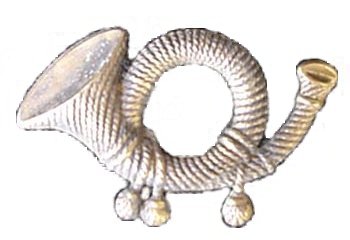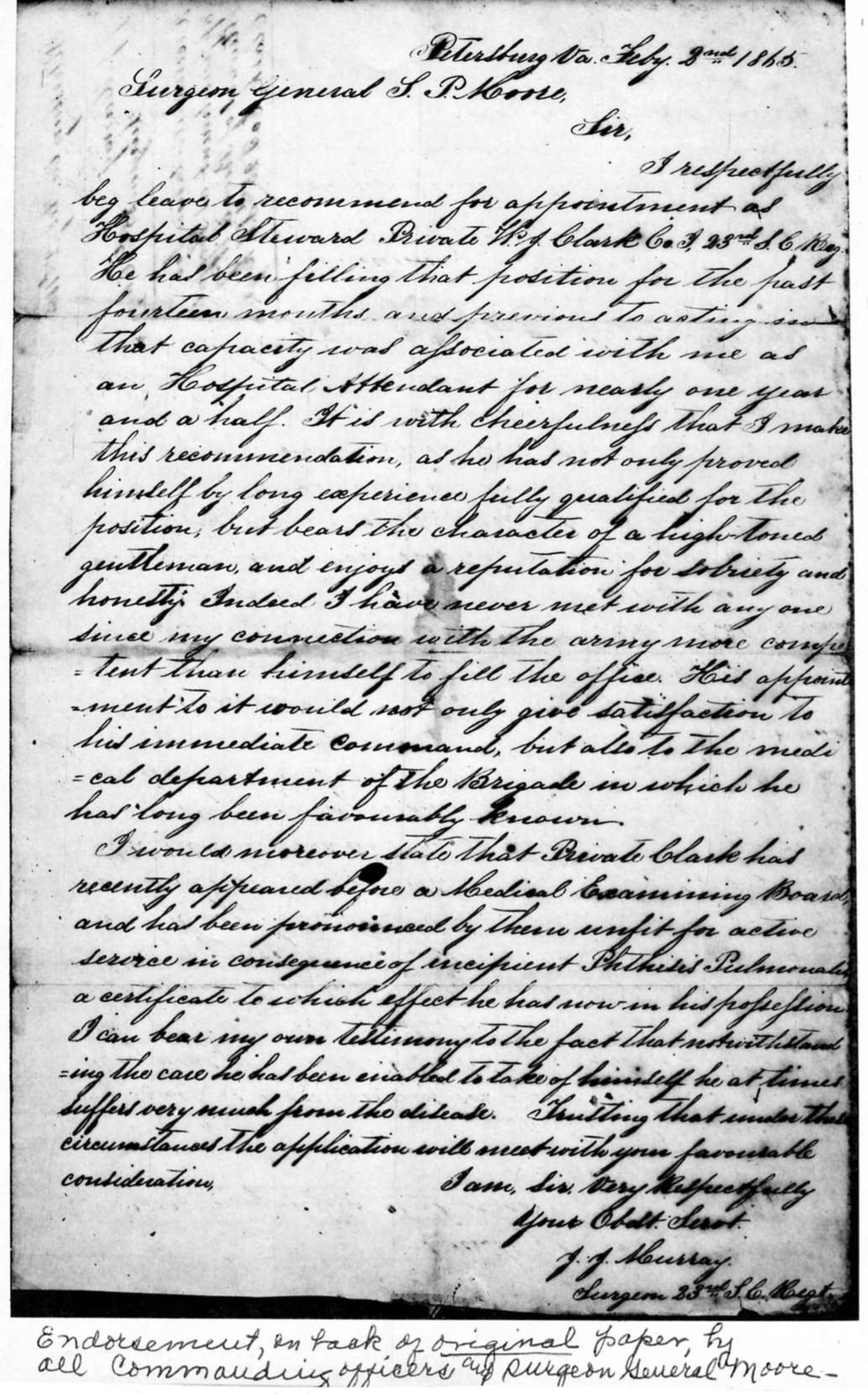|
One of my Confederate Ancestors was William James Clark, born on 10 December 1834 in Charleston, S.C. to William Clark and Ann LaComb Perdriau Clark. William was listed in the Charleston City Directory for 1835-36 as a grocer and resided at 125 Queen St. In June 1838 the family moved to Sumter, S.C. He was educated in the Sumter area and at the age of 14 was elected as president of an Organization of Temperance Society that was also call the “Cold Water Army”. About 1854 he moved to an area of Clarendon County which became the Town of Manning by State Legislature in December 1855. He soon met Margaret Ann Stukes the daughter of a large land owner Joseph Hamlet Stukes and Susan Richbourg Stukes and they were married on 5 October 1854 and lived on part of the Stukes land which later became Clark’s Hill. They had their first 4 children with the last son being born 2 weeks before he enlisted as a Private Soldier at Morris Island, S.C. on 15 May 1862 in Company “I”, 23rd Regiment, South Carolina Infantry, under the command of Colonel Henry L. Benbow (1829-1906).
Hatch’s Coast Rangers as it was first know as assembled in Charleston, S.C. in November, 1861. Most of the men were from Charleston, Georgetown, Charleston and Georgetown counties.
The 23rd Regiment was organized on 13 April 1861 and was reorganized under the Conscript Act in May 1862. The Company officers were elected on 9 May 1862 and the Regimental officers on 24 May 1862. The company staff consisted of:
• H.L. Benbow, Col
• H.H. Lesesne, 1st. Lt
• R.B. Harvin, 2nd. Lt.
• T.N. Slawson, 3rd. Lt.
• D, J. Bradham, O.S. Sergt.
• J.E. Wells, 2nd. Sergt.
• E.H. Cuttino, 3rd. Sergt.
• W.J.R.Cantey, 4th. Sergt.
• H.D. Wells, 5th. Sergt.
• W.F. Butler, Com. Sgt.
• S.P. Wells, 1st Corpt.
• W.R. Coskrey, Sgt.
• N.W. Baggett, Sgt.
• W.Crook Watt, Sgt.
• R.A. Ridgill, Sgt.
• R.J. Hodge, Sgt.
• J.D. Beatson. Corpl.
• W.H. Cole, Corpl.
• H.B. Drose, Corpl.
• S.L. Eadon, Corpl.
• I.T. Hodge, Corpl.
• J.W. Thames, Corpl.
• William James Clark, Hospital Steward.
As part of the 23rd Regiment William James participated in the following battles.
* Malvern Hill, Virginia 1 July 1762
* Rappahannock Station, Va. 23 August 1862
* 2nd. Manassas, 6-20 August 1862
(During this regiment lost 68% of the 225 engaged and all of the field officers were wounded.)
* 2nd Bull Run, Va. 28-30 August 1862
* South Mountain, Va. 14 September 1862
* Antietam, Va. 17 September 1862
* Jackson Siege, Miss. July 1863
* Charleston Harbor, S.C. August thru September 1863
* Bermuda Hundred, Va. 17 May thru 16 June 1864
* Petersburg Siege, Va. June 1864 thru April 1865
His company went on to fight in the following battles,
* Petersburg, Va. 9 June 1864
* The Crater, Va. 30 July 1864
*Ft. Stedman, 25 March 1865
*Five Forks, Va. 1 April 1865
(Colonel H.L. Benbow was shot through both thighs, captured and ended the war as a Federal prisoner.)
* Appomattox Court House, Va. 9 April 1865
William James was wounded and suffered from extreme exposure near Petersburg, Virginia in January 1864 and was sent to the Base Hospital C.S.A. in Petersburg, Virginia. While recovering from his wounds he began serving in the Hospital as Steward. His wounds rated him a discharge but he chose to stay and be of service in any way he could. The 23rd Regiment Surgeon at the time J.J. Murray wrote a letter to the Surgeon General J.P. Moore on 2nd. February 1865 for a formal appointment as Hospital Steward to the Base Hospital C.S.A. in Petersburg, Va. A position he had been serving for the past 14 months during his recovery. In his endorsement he was described as “Bears the character of a high-toned gentleman and enjoys a reputation for sobriety and honesty”. His appointment was signed by all his Commanding Officers and the Surgeon General J.P. Moore.
William James served as Hospital Steward until Robert E. Lee’s surrender at Appomattox Court House on 9 April 1865 and was paroled on that date also.
With that the war now over Prvt. Clark began his long walk home to his lovely wife and children. According to a family journal when he arrived home “ he sent for his negro man servant to bring hot water and clean clothes, where he used the horse’s watering tub to bath and dress before greeting his wife and children. He and Margaret Ann went on to have 3 more children before she died suddenly on 7 November 1883. Soon after he met and married Mary Capers McKagen the daughter of John Walter P. McKagen and Sarah Katherine Brown McKagen of Sumter, S.C.
The couple was married in Sumter, S.C. on 15 December 1884. This marriage produced 4 more children for Mr. Clark, the second of which was my Grand Mother Sarah Catherine Clark Spigner who was born on 16 May 1887. Prvt. Clark died suddenly on 29 January 1890 at the age of 56.
According to his obituary after returning from the war he qualified as a Magistrate in Clarendon County on 20 February 1866 ” until Legislature meets” and again on 12 January 1867 and served until 1871. He also served as the Assistant Assessor of Internal Revenue for Darlington District. He was the Clarendon County Sheriff 1870-1876 and was the Town Mayor for Manning, SC in 1880 and a member of Town Council for several terms. He was the Charter Worshipful Master of St. Peters Lodge #54 Ancient Free Masonry in Manning, S.C. and was the only Knights Templar in the county. He was the Chancellor Commander of the Knights of Pythias Lodge for several terms and President of the County Survivors Association. During his last 15 years he was a book keeper for Loyns Mercantile of Manning, S.C. His funeral service was held to a standing room only crowd at Manning Presbyterian Church and buried in the Manning Cemetery.
On 17 March 1917 a letter to the editor of the Manning Times read:
Editor,
Please find enclosed the roll of Confederate soldiers of Clarendon County who volunteered at Manning and other places during the war as Co.”I” 23rd. S.C. Vol-(Sprott Guards)- You will note there are 174 volunteers and out of that list only 11 are still alive. As far as I know 163 have been killed, wounded or died. To all who read this list of dead Confederate veterans, if you will cut this roll out of this paper or typewrite a copy of the same, frame and hang it in your parlor walls, in years to come your heirs will search the rolls of the old Confederate dead to find if you are a heir or joint heir to the best blood this country offered on her alters, for the protection of Mothers, homes and country. You may write them in gold if you wish, for they wrote them for you in their blood and suffered four long years. Only eleven left of this gallant band and they are soon to cross “ The Great River of Death” to unite with them to the last roll call at the bar of God.
Signed,
A.J. Richbourg,
Sgt. Maj. 23rd. S.C. Vol.
What a powerful letter to write in his old age. The youth of his inner being showed through to remind us of the sacrifice they gave to protect their families and land. He went on to list every man’s name in the company and those names that were still alive in 1917.
As I look at the life and times of my Great Grandfather –William James Clark. I can only stand in awe of the accomplishments of this great man in his short 56 years. There is no telling what more he might have accomplished had he lived another 20 or 30 years. When I attended the Hunley funeral to assist with the Masonic Rites I felt like I was back in time and attending my own Great Grandfather’s funeral. With this in mind it is my duty to Honor his name as a Patriot of the Confederate States of America.

|




